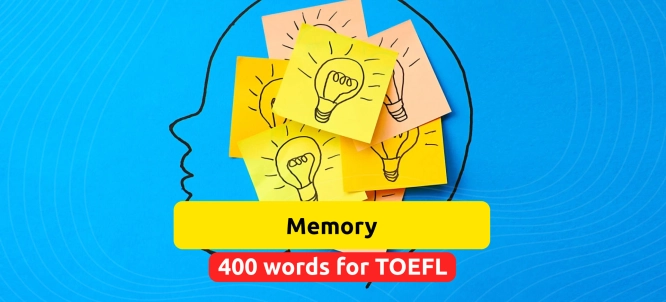by PushtoLearn
Memory
Table of Contents
Memory Flashcards - Vocabulary Practice for TOEFL
These exercises focus on Memory Vocabulary
List of Memory Words for the TOEFL
|
Word |
Definition |
Example |
|
Acquisition |
The act of gaining or obtaining something. |
The acquisition of new knowledge is essential for learning. |
|
Anomaly |
Something that deviates from the norm. |
The researcher found an anomaly in the memory recall experiment. |
|
Consciously |
With awareness or intent. |
She consciously focused on remembering the details. |
|
Degrade |
To lower in quality or diminish in ability. |
Over time, old photographs degrade, losing their clarity. |
|
Gap |
A space or difference between two things. |
There is a significant gap between short-term and long-term memory. |
|
Indisputable |
Impossible to doubt or deny. |
The link between sleep and memory retention is indisputable. |
|
Intervene |
To get involved to prevent or change a situation. |
The teacher had to intervene when the students forgot their project deadlines. |
|
Intuitively |
In a way that is based on instinct rather than reasoning. |
She intuitively knew the answer, though she couldn’t explain why. |
|
Recede |
To move back or diminish. |
As the pain receded, her ability to focus improved. |
|
Retrieve |
To bring something back or regain access to it. |
He struggled to retrieve the information stored in his memory. |

Usage in TOEFL Exam Formats
Reading Section
-
Words like acquisition, anomaly, and gap often appear in scientific or psychological passages.
-
Example Question: What does the author suggest about the gap between memory types?
Listening Section
-
Terms like intervene, degrade, and retrieve may be used in lectures on cognitive science.
-
Example: “The brain retrieves information from long-term memory when needed.”
Writing Section
-
Use terms like indisputable, consciously, and intuitively to enhance your essays.
-
Example Sentence: “The indisputable link between nutrition and memory retention is well-documented.”
Speaking Section
-
Employ words like recede, acquisition, and intervene to articulate ideas during speaking tasks.
-
Example: “To improve memory acquisition, individuals should consciously focus on their study habits.”
Common Mistakes
-
Misusing "Acquisition" as Ownership:
-
Mistake: "The acquisition of the car improved her memory."
-
Correction: "The acquisition of knowledge is essential for growth."
-
Confusing "Anomaly" with Normality:
-
Mistake: "The anomaly is a regular occurrence."
-
Correction: "The anomaly was a rare and unexpected result."
-
Overusing "Consciously" in Inappropriate Contexts:
-
Mistake: "She consciously walked to the park."
-
Correction: "She consciously worked to improve her memory."
-
Misapplying "Degrade" for Positive Changes:
-
Mistake: "The skills degrade as practice improves."
-
Correction: "The skills degrade when practice is neglected."
-
Using "Retrieve" Incorrectly in Abstract Contexts:
-
Mistake: "He retrieved his confidence from the test."
-
Correction: "He retrieved the information from his memory for the test."
FAQ
What does "acquisition" mean in cognitive science?
"Acquisition" refers to the process of gaining or learning new knowledge or skills, such as acquiring a new language.
How is "retrieve" used in memory-related contexts?
"Retrieve" means recalling or accessing stored information, e.g., “The brain retrieves facts from long-term memory.”
What’s the difference between "consciously" and "intuitively"?
"Consciously" refers to actions done with awareness, while "intuitively" refers to actions based on instinct or without deliberate thought.
Why is "degrade" relevant in memory discussions?
"Degrade" describes the loss of quality or function, such as when memory fades over time due to aging or lack of use.

